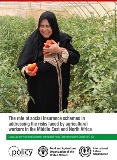Near East and North Africa: FAO and ILO host the launch of the Policy incubator to boost social insurance for agricultural workers

Amman - The Food and Agriculture Organization of the United Nations (FAO), in collaboration with the International Labour Organization (ILO), launched the Policy incubator to Enhance Social Insurance for Agricultural Workers of the Near East and North Africa in Amman, Jordan, this week.
Policymakers, practitioners, experts, and representatives of agricultural workers from Jordan, Lebanon, Iraq, Oman, Algeria, Morocco, Egypt and Tunisia joined the three-day event, marking the initial step towards the establishment of a community of practice for reflections and knowledge sharing on extending social insurance for agricultural workers in the region through interactive peer-to-peer knowledge exchange and learning.
The meeting aimed to institutionalize a space for showcasing innovative solutions, ongoing reforms, and implementation practices both intra-and inter-regionally. It intends to develop a regional compendium to reflect promising practices and innovative solutions and identify opportunities to support further social insurance reforms for agricultural workers.
While the identification of legal, economic, financial, and administrative barriers to the extension of social insurance to agricultural workers is necessary according to the context of each country, successful sharing of experiences is critical to identify good practices to in providing social security coverage for agricultural workers. Participants addressed country-specific challenges and started devising mutually beneficial solutions through cross-country working groups exchanges.
“The agricultural sector plays a critical role in food production, economic development, and environmental sustainability across the MENA region. In 2019, it employed 18.7 percent of the total workforce in the region,” said Ruba Jaradat, Regional Director for Arab States at the International Labour Organization. “Despite its importance, the sector remains largely informal, lacking basic decent work standards and social insurance. By sharing experiences and best practices, we aim to establish a regional policy incubator to support ongoing reforms and ensure the inclusion of agricultural workers in social security systems.”
According to a joint study by the International Labour Organization, the Food and Agriculture Organization, and the International Policy Centre for Inclusive Growth, some countries reporting that the sector employed at least a quarter of their workforce.
“Agricultural workers and small-scale producers in fisheries, forestry, livestock, and farming endure several economic, health, and environmental risks,” said AbdulHakim Elwaer, FAO Assistant Director- General and Regional Representative for the Near East and North Africa. “The prevalence of informal employment leaves them exposed to hazardous conditions, with irregular incomes and limited access to stable employment or social security. Fostering meaningful dialogue and paving the way for impactful policy reforms is a pivotal step toward practical implementation of accessible and effective social insurance schemes for men and women dependent on agriculture.”
The sector is characterized by its inherently hazardous nature, significant poverty levels among its workforce, and the profound impacts of climate change. Robust social protection systems are crucial in addressing poverty, inequality, and ensuring a just transition for agricultural workers.
“Rather than addressing the issue solely from the perspective of social insurance, it should be considered within a broader context where all dimensions are examined,” said Mehdi Ben Braham, economist and consultant with the ILO Regional Office for Arab States. “This will allow for a comprehensive response aimed at modernizing the sector, increasing productivity, and facilitating participation in the contributory system, where workers have both rights and responsibilities.”
The agricultural sector is crucial for achieving multiple Sustainable Development Goals (SDGs), especially those related to reducing inequalities and combating climate change. However, a 2018 ILO study revealed that over 90 percent of agricultural workers in low and middle-income countries are employed informally. ILO estimates indicate that in 2024, approximately 1.1 billion people globally are working in agriculture, with the majority residing in rural areas and dependent on this income. A large share of agricultural workers in the MENA region are non-nationals (migrants and refugees) who face additional barriers to their inclusion in social security systems.
The event was supported through the PROSPECTS Programme, a global partnership that aims to improve the access of host communities and forcibly displaced people to education, social protection and decent work, supported by the Kingdom of the Netherlands, and with contribution by FAO.

